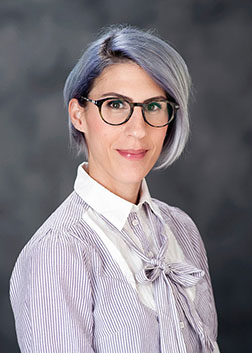Merivaki to discuss COVID-19’s potential effect on 2020 elections Monday

Thessalia Merivaki
In a virtual format open for pubic interaction, a Mississippi State University faculty member specializing in American politics will provide expert analysis of the effects COVID-19 may have on the political processes for the 2020 elections.
Thessalia Merivaki, an assistant professor in MSU’s Department of Political Science and Public Administration, shares her perspective on the presidential and senatorial elections during an 11 a.m. Monday [May 11] interview with Julia Osman, director of MSU’s Institute for the Humanities and associate professor of history.
The online discussion will be featured via the Institute for the Humanities Facebook page.
“How will the current pandemic affect voters and how will it affect the politicians’ approach toward getting the vote? How much will the current pandemic be part of the candidates’ platforms? How can average Americans be best informed about what is going on politically in the coming months? I am hopeful that Dr. Merivaki will be able to tell us what to expect regarding the elections, and what we can expect from our political leaders and political hopefuls this summer and fall,” Osman said.
“Before the pandemic hit, the news was dominated by coverage of the election and by all the democratic candidates vying for the nomination. Then, when Covid-19 became a concern in the U.S., suddenly we stopped receiving so much election news,” Osman said.
Merivaki’s specialized research at MSU seeks to perform an “empirical assessment of election reforms on the administration of elections across the American states.” She studies the impact of election reforms on local election administrations, as well as the impact of local election administration on equal access to the voting process.
Merivaki said COVID-19 may make physical polling places “intimidating for voters who do not want to come into contact with other people.”
“Potential solutions include voting by mail,” Merivaki said. “While it appears to have many benefits based on evidence from other states, many challenges remain in ensuring that all eligible voters are aware about how to do it, and most importantly, have the resources and training to verify and count all valid votes. The concerns about equity under the law remain.”
Merivaki said, “In the United States, [voters] place emphasis on their civil liberties. If that is compromised, many lose faith in political institutions.”
However, Merivaki said in the field of political science, she sees that “some trade-offs may be necessary, since we elect representatives to make decisions on our behalf. The challenge is managing this thin line of governance versus protection of personal liberties.”
Currently, her MSU research is focused on voter registration reforms, particularly as they relate to improving voter list maintenance and the dissemination of election information to prospective voters. Her most recent manuscript, “Our Voter Rolls are Cleaner than yours: Investigating Voter List Maintenance Practices,” is published in American Politics Research. Merivaki’s work finds that inactive voters are more vulnerable to inaccuracies in voter records, which can lead to premature removal from voter rolls.
Merivaki received her bachelor’s degree at the University of Macedonia in Thessaloniki, Greece, and a master’s degree from the University of Sheffield, UK. She received her Ph.D. from the University of Florida. Merivaki worked in Brussels, Belgium, during the European Parliament election campaign in 2009.
As part of MSU’s College of Arts and Sciences, the Institute for the Humanities promotes research, scholarship and creative performances in the humanistic disciplines and raises their visibility, both within Mississippi State University and the wider community. The Institute is active on social media on Instagram @msststehumanities, Twitter @Humanities_MSU and Facebook @msu.humanities.institute.
MSU’s College of Arts and Sciences includes more than 5,200 students, 325 full-time faculty members, nine doctoral programs, 14 masters programs, and 27 undergraduate academic majors offered in 14 departments. It also is home to the most diverse units for research and scholarly activities, including natural and physical sciences, social and behavioral sciences, and the humanities. For more about the College of Arts and Sciences or the Institute for the Humanities visit www.cas.msstate.edu or www.ih.msstate.edu.
MSU is Mississippi’s leading university, available online at www.msstate.edu.
John Burrow | College of Arts and Sciences



